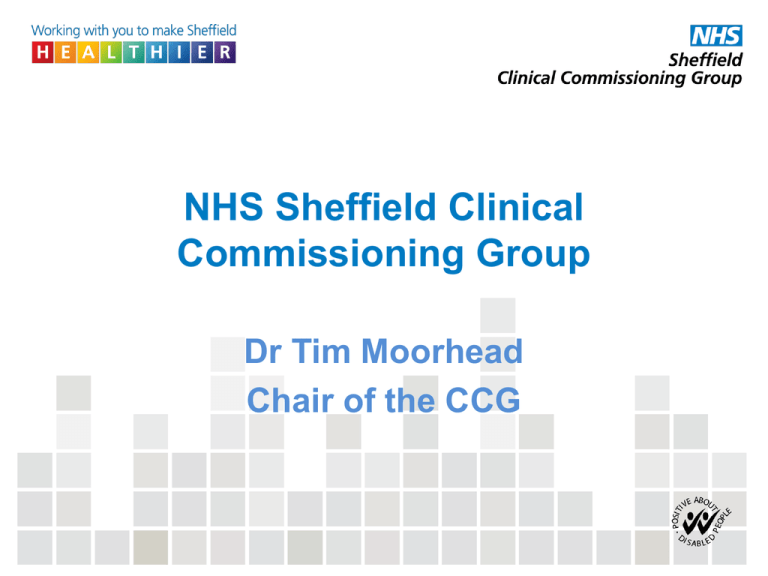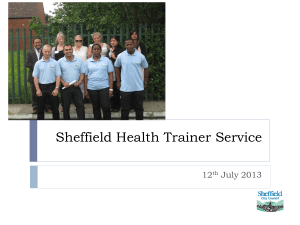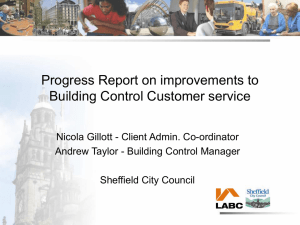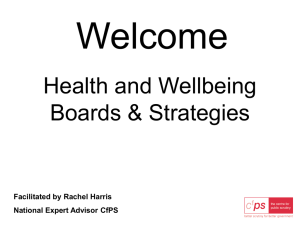official presentation from the day, then please click
advertisement

NHS Sheffield Clinical Commissioning Group Dr Tim Moorhead Chair of the CCG Welcome to our first Annual General Meeting • Who we are • Purpose of the Annual General Meeting • Agenda Our First Year • Our aims taken from our Prospectus: – To improve patient experience and access to care – To improve the quality and equality of healthcare in Sheffield – To work with Sheffield City Council to continue to reduce health inequalities in Sheffield – To ensure there is a sustainable, affordable healthcare system in Sheffield • Setting up a new clinically focused organisation with no legal restrictions to deliver our key aims Key Milestones • April 1st - Launch of CCG – fully compliant with the law • Our first commissioning plan – – – – Musculoskeletal Services Urgent Care (Primary Care Centre/111) Integrating Health and Social Care Improved Elective Pathways – designed by clinicians for patients – Care Planning within Primary Care – Right First Time – “Involve Me” - engage with us Media coverage – Sheffield Star GPs handed £700m in first step of NHS reform FAMILY doctors have been handed control of a major chunk of Sheffield’s £1 billion NHS budget as health bosses enact the first stage of the Government’s controversial health reforms. A small group of eight GPs, a nurse, four lay members and three officials have taken over responsibility for £709 million – 71 per cent – of the city’s health commissioning budget. The money is used for all hospital, ambulance and mental health services. The Government’s proposals to end the role of the existing Primary Care Trusts and give the budgets to GPs sitting on new Clinical Commissioning Groups have not yet passed through Parliament – and, if they do, the change will not take place until the end of March 2013. December 2011 Media coverage – Health Service Journal April 2014 Media coverage – Sheffield Star Chance to shape Sheffield’s mental health services The chance to shape mental health service provision in Sheffield is on offer to care users and professionals in the city. NHS Sheffield Clinical Commissioning Group is asking those with three years or more experience of mental health services - either as a carer or care user – to help inform ‘strategic plans’ and ensure future services are meeting the area’s needs. Those selected will be asked to attend meetings of the Mental Health Partnership Board. A statement released by the board said: “The Sheffield health and wellbeing community are keen to ensure that people with experience of using mental health services directly, and those who care for them, help to inform our strategic plans.” May 2014 Media coverage – Sheffield Star Sheffield health chiefs’ budget plan ‘ambitious’ Plans to create the country’s biggest joint budget for health and social care services in Sheffield have been singled out for praise. The NHS Sheffield Clinical Commissioning Group and the City Council want to create a pooled budget of £278 million, meaning they will work together more closely to run services. Next year a new national policy called the Better Care Fund comes into force, which orders CCGs and Councils to pool £41 million from their existing funding meaning that, in Sheffield, £237 million more is being added to the pot than officially required. The focus will be on setting up a single service to support people following a spell in hospital or social care, and providing more alternatives to hospital wards. June 2014 Media coverage – Sheffield Star Sheffield A&E is fit for winter freeze Extra nurses, more ambulances and longer GP opening hours are all being planned to avert a crisis at A&E in Sheffield this winter, The Star can reveal. Health chiefs in the city have announced details of proposals to stop the emergency ward at the Northern General Hospital being inundated with patients in freezing weather. The NHS Sheffield Clinical Commissioning Group has set aside hundreds of thousands of pounds to pay for extra workers, increase the number of care beds, provide longer GP opening hours and lay on more ambulances to transfer patients between hospitals. Idris Griffiths, the commissioning group’s chief operating officer, told The Star a ‘very demanding winter’ is expected. But he added: “We’re confident we’re doing all we can to prepare for winter.” November 2013 Media coverage – Health Service Journal Sheffield shows foresight with new eyecare model A new approach to eyecare in Sheffield, saves money, develops new leaders, improves the patient experience and provides lessons other areas can follow, writes Dr Richard Oliver. The NHS is facing an unprecedented squeeze with healthcare budgets under increasing strain. At the same time, the ageing population’s needs are becoming ever more expensive. The demand on the health service is such that it must deliver more care with fewer resources. ‘Our patients can now be seen at times and places that are more convenient for them. We estimate we are saving Sheffield CCG around £400,000 a year’. In Sheffield, one way we have addressed this is with the introduction of a new approach to eyecare, which saves money, improves patients’ experiences and provides a model other areas can follow − as well as demonstrating how leadership can make the introduction of new services more effective. October 2013 Our Challenges • Making sure we balanced our books and passed our assurance tests– Julia and Ian will update on the detail of our success • Making sure we engaged with you and our member practices • Making sure we responded to the national challenges of Integration (The Better Care Fund) and Co-commissioning • Making sure our contribution to the City Health and Wellbeing Board delivered real clinical focus Clinical Commissioning for Sheffield • A successful first year • Integration of Health and Social Care – ahead of the country • Primary and Community service development – particularly going forward • Clinical Outcome based contracts with our providers • Involve Me – your voice is more important than ever – Ted and Mark will tell us more shortly • Quality of services is at the heart of all our decisions • Working with our hospitals and Council to improve services Ian Atkinson Accountable Officer Julia Newton Director of Finance Making sure the CCG delivers its legal duties • The way we are organised as a CCG has been reviewed as effective by our auditors and NHS England • We had 4 Assurance meetings with NHS England throughout the year and had full assurance each time - “It is clear that the CCG has had a positive first year and should be proud of what it has achieved” NHS England Q4 Letter • As Julia will describe, we have balanced our books CCG Financial Performance 2013/14 • We balanced our books Delivered 1% (£6.9m) surplus required by NHS England • We managed our cash CCG remained within our cash limit of £669m • We stayed within our Running Costs Allowance Actual spend of £9.7m (£17 per head) compared to maximum allowance of £14.1m (£25 per head) • Positive report from External Auditors We had an unqualified opinion on our accounts How Did We Spend Each £ 2013/14 Pence Primary and community services 13** Prescribing by GPs 13 Acute Hospital Care Elective care 19 Urgent care 20 Other e.g., maternity, critical care 13 Ambulance services Mental health and learning disabilities Long term care 3 12 7 100 **The CCG unlike Sheffield PCT does not contract for the core services provided by GPs, dentists and pharmacists. NHS England contracts for these services along with specialised hospital services. Our Plans for 2015/16 Dr Zak McMurray Clinical Director We are guided by our strategic aims Our four prospectus aims remain at the heart of our ambition • To improve patient experience and access to care • To improve the quality and equality of healthcare in Sheffield • To work with Sheffield City Council to continue to reduce health inequalities in Sheffield • To ensure there is a sustainable, affordable healthcare system in Sheffield We have committed to the priorities in the Joint Health and Wellbeing Strategy • Sheffield is a healthy and successful city • Health and Wellbeing is improving • Health inequalities are reducing • People get the help and support they need • Services are affordable, innovative and deliver value for money And we see a shift of care closer to home as a key part of achieving these aims, reducing the need for travel to hospital by supporting people better in local communities. What we need to respond to Our ambitions for the next five years are unchanged All those who are identified to have emerging risk of admission through risk stratification are offered a care plan, agreed between them and their clinicians (possibly 15,000 people) By establishing integrated primary care and community based health and social care services, care planning, and holistic long term conditions management to support people living independently at home, reduce emergency admissions by up to 20%, Emergency Department attendances by up to 40% Minimise repeated trips to the GP and hospital for specialist diagnosis and monitoring of health problems, replacing them with community and home based services that make best use of technology, and keep people at the centre of their care Reduce the gap in life expectancy for people with mental health problems and learning disabilities Put in place support and services that will help all children have the best possible start in life 2015/16 is the second year of the plans for 2014-16 already published Our Priorities for Next Year • Focussing on improving care for people with the worst health, including older people, people with several long term conditions and those with respiratory conditions, • With the City Council, through integrated commissioning, we plan to: – Extend care planning – Test the “Keeping People Well in Their Communities” model proposed in our integrated commissioning plans – Specify and procure improved intermediate care services – Establish an integrated approach to long term health and social care Our Priorities for Next Year CCG specific priorities include: – – – – – Improving community nursing services Mobilisation of the outcomes based contract for musculoskeletal services Contributing to delivery of Sheffield’s Health Inequalities Plan Transforming outpatient services Redesigning urgent care services To help achieve these aims, we will be working with NHS England to: – Have more influence over commissioning of primary care services – Be actively involved in and supporting NHSE commissioning of specialised services And will be supporting primary care providers to establish a collective approach to care provision, and collective working with other providers








